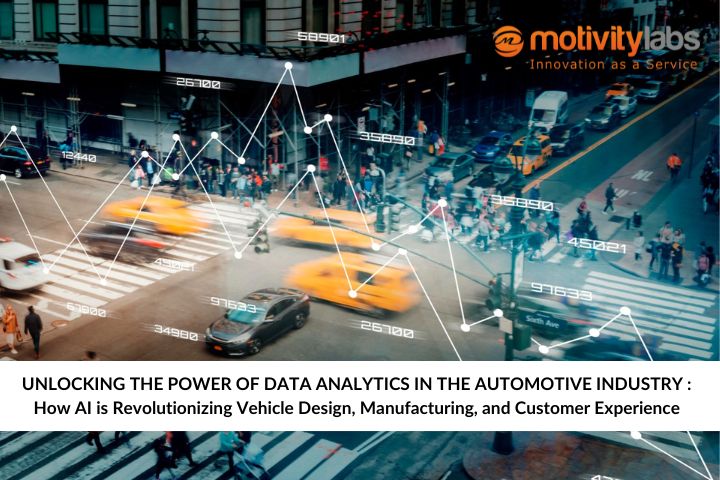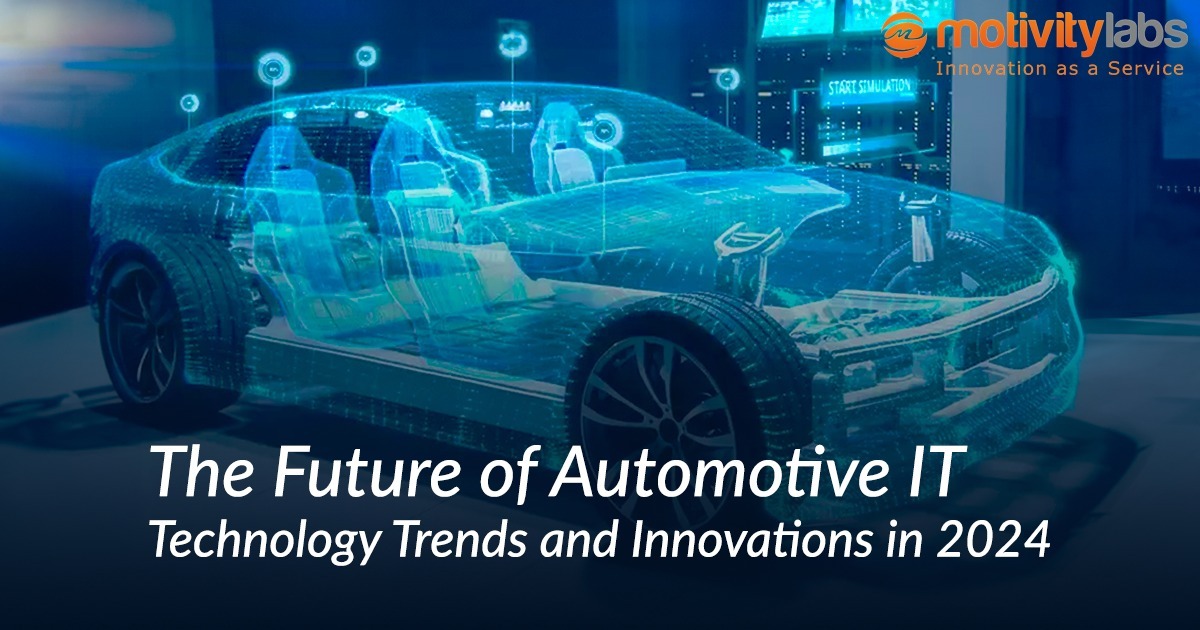Market Overview
The automotive industry is poised for significant growth, with projections indicating a market valuation of $2 trillion by 2025. This expansion is underpinned by robust annual vehicle production volumes. Despite its substantial economic footprint, the sector faces regulatory, consumer and sustainability challenges.
These hurdles can be overcome by leveraging AI and data analytics in automotive industry. By utilizing data from a variety of sources including vehicles themselves, production facilities and customer interactions; companies in the sector can make informed decisions to achieve outcomes by streamlining processes for enhanced value delivery.
Why Data Analytics for Automotive Industry is Important?
Data analytics in automotive industry, coupled with AI allow automobile creators to use big data for improving innovation and effectiveness in all areas. Starting from design, AI is changing how vehicles are manufactured and delivered.
How is Data Analytics Used in the Automotive Industry?
Smart Decision Making
The combination of AI and automotive data analytics helps understand patterns in data, enabling automation for quicker decision making. This is a key aspect of digitalization in automotive industry that can lead to better safety measures, lower costs and improved customer experiences.
Predictive Maintenance
Predictive maintenance entails using AI to analyze sensor data and other sources for predicting equipment breakdowns or maintenance needs. It reduces unexpected breakdowns, saves money by avoiding unnecessary repairs and enhances safety for workers.
Personalized Interactions with Customers
When AI algorithms analyze large amounts of customer information, they can find patterns that help businesses personalize their products. It allows companies to offer tailored suggestions or address specific needs, which leads to increased customer satisfaction. Digital transformation in automotive industry enables these personalized experiences.
Safety Benefits
AI has made it possible for machines like drones and robots with sensors (Internet of Things) to identify risks quickly in workplace environments. Using these technologies with data analytics in automotive industry methods such as pattern recognition algorithms, safety hazards are found faster than before; this helps prevent accidents by providing timely warnings about dangers.
Cost Savings
When AI combines with analytics on large amounts of complex information (Big Data), cost savings are realized. For example, we can spot areas where there is excess energy use or waste production within a factory process; this gives insight into how best changes can be made such that resources are used efficiently while also reducing environmental impact. Digitalization in automotive industry enables these cost optimization strategies.
Role of Big Data in Automobile Industry

AI and automotive data analytics are very important in vehicle design. Before, the process of designing a vehicle included many iterations and required much manual work. But now with AI algorithms able to analyze large datasets for finding patterns or trends among them has greatly accelerated this procedure, demonstrating the power of digital transformation in automotive industry. For instance, AI-based generative design lets engineers put in design conditions like materials, weight limits and performance targets. The end result is different designs, improving on things such as aerodynamics, fuel efficiency along with its structural integrity.
AI-powered analytics can predict design trends by examining consumer tastes and market data. Machine learning models have the ability to analyze social media, sales information, and feedback from customers. This makes possible for automakers to better fit their designs with what the market is looking for in terms of preferences and trends. For example, we can see how AI is assisting in the growth of demand for electric vehicles (EV) and sustainable materials by using its understanding about consumer behavior and concerns regarding the environment.
How to build the automotive business for the future
AI-powered Manufacturing
AI-powered analytics are changing the way manufacturing works, making it more efficient. This is a prime example of digitalization in automotive industry. In smart factories, AI systems check each step of the production line to find blockages and improve the process. Periodic maintenance that can predict issues, are made possible by AI technology, helping keep machines working optimally, which decreases non-operational time along with maintenance expenses. For instance, BMW’s utilization of AI in their manufacturing plants has resulted in considerable decrease in production time and expense with enhanced overall quality.
Lowering Costs
Reduced costs are another big advantage of AI in manufacturing. AI examines information coming from different sources, and can recognize areas where resources are getting wasted and recommend methods to make resource distribution more efficient. This helps in reducing material expenses, as well as lessening energy usage and labor costs. For example, Ford makes use of AI for better managing their supply chain. This helps in lowering costs related to keeping inventory and also guarantees that parts are delivered on time.
Quality Control
In automotive manufacturing, quality control is of prime importance and AI systems have a critical part to play in it. This aspect of digital transformation in automotive industry is crucial. Machine vision systems that use AI algorithms can inspect components with more precision compared to human inspectors. They are capable of identifying defects, deviations and inconsistencies in real-time such that only products passing stringent quality standards are approved. Toyota’s use of AI-based quality control systems has led to fewer recalls and improved customer satisfaction.
What are automotive analytics solutions?
Personalized Customer Experience
AI can make sure that the customer experience is more personal. By using data analytics in automotive industry, car makers have the ability to understand each customer’s likes and actions. They then provide tailored suggestions for services or products as well as aim their marketing efforts at certain groups of people along with customizing in-car experiences accordingly. Digital transformation in automotive industry makes this level of personalization possible.
Predictive Maintenance
Periodic planned maintenance can really change the game for customer satisfaction. AI algorithms study vehicle information to foresee when maintenance will be needed, averting sudden breakdowns and lowering upkeep expenses. This thinking method helps vehicles last longer and guarantees they work at their best. General Motors, uses OnStar which is an AI-powered telematics service to keep track of the health condition of the vehicle and give a warning to its owner about any possibly expected problem before it becomes a huge issue.
Enhanced User Experience
AI also boosts the general user experience through sophisticated infotainment systems, voice identification, and connectivity. Natural language processing (NLP) allows drivers to communicate with their cars through speech instructions, making the drive more natural and pleasant. For instance, Tesla’s infotainment system powered by AI offers smooth connection with different applications and services to create a highly interactive and connected driving experience. This is enabled by digitalization in automotive industry.
Benefits of Data Analytics: Automotive Industry

Trends in Data Analytics and Automotives
The future of data analytics is shaped by several emerging trends, such as: –
- Autonomous Vehicles
- Electric Vehicles (EVs)
- Connected Cars
- Sustainability
Data Analytics in Automotive Industry Use Cases
Here are a few use cases illustrating the transformative impact of automotive data analytics:
- General Motors (GM) optimizes its supply chain using data analytics.
- Toyota uses analytics and AI to improve quality control and forecast maintenance requirements. Mercedes-Benz leverages AI to enhance the general customer experience by personalizing interactions with customers.
Ready to accelerate your automotive strategy with data analytics?
For automotive companies, understanding AI and data analytics can be challenging. Motivity Labs is a leading company providing solutions for these businesses. They have strong knowledge about the newest technologies and of the complicated needs of the automotive industry. This makes them an important ally to help automakers fully utilize AI and data insights by offering a wide range of services that includes strategy, development, to implementation and ongoing support for digitalization in automotive industry.
Motivity Labs' team of experts can assist automotive companies in various areas, including:
- Vehicle Design with AI: Using powerful simulations, generative design and forecasting models, Motivity Labs can assist in improving vehicle designs for safety, performance and appearance. This also helps to lower time-to-market and development expenses.
- Intelligent Manufacturing Solutions: Motivity Labs can contribute to enhancing manufacturing methods through the application of AI-driven forecasting maintenance, quality management, and production preparation systems. This leads to better procedures, more effectiveness and reduced faults that result in cost savings and profit progress.
- Customer Experience Transformation: By using AI-based customization, anticipating maintenance needs and smart virtual assistants, Motivity Labs can assist in improving customer experiences for car manufacturers. This includes increasing brand loyalty and promoting lasting relationships with clients.
- Data Management and Security: Motivity Labs possess deep knowledge in data management, ensuring that automakers adhere to privacy rules while extracting maximum value from their data. They guarantee to protect their privacy, ensuring customer trust remains intact.
Motivity Labs offers an opportunity for automotive companies to leverage the latest in AI and data analytics. This can help businesses be more competitive and push innovation in all areas, from design to production and customer experience.



